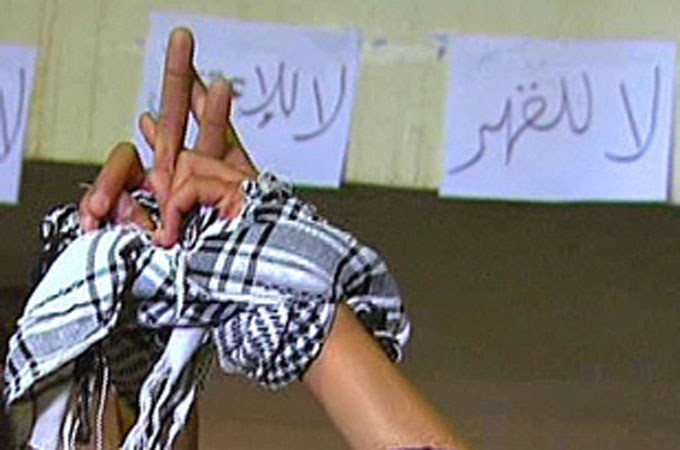Arabs blogging in defiance
Online dissenters risk harsh jail terms in Middle East – the region ranked highest in blogger arrests.

 |
| “The Middle East ranks the highest in blogger arrests, with Egypt, Tunisia, and Syria coming in with the largest numbers only after China” Jillian York [Al Jazeera] |
On March 2, Qatar arrested a blogger, a young man by the name of Sultan Khalifa al-Khalaifi, whose blog contained statements critical of the government. Though this was Qatar’s first time arresting someone for content posted online, it represents a foray into a worrying trend.
According to a recent report by Reporters Without Borders, 119 “netizens” (that is, bloggers and anyone else who has posted content on the Internet) are currently behind bars. The Threatened Voices project tracked 35 blogger arrests in that same year, and already this year, at least three more have been arrested, and one -19-year-old Syrian Tal al Mallouhi – sentenced to five years in prison.
Keep reading
list of 4 itemsHong Kong’s first monkey virus case – what do we know about the B virus?
Why will low birthrate in Europe trigger ‘Staggering social change’?
The Max Planck Society must end its unconditional support for Israel
At least two of those three – Al-Khalaifi and Syrian Ahmed Abu Al-Khair – are from the Middle East. In fact, the region ranks among the worst, with Egypt, Tunisia, and Syria coming in with the largest numbers only after China.
No fewer than 10 bloggers sit in Syrian prisons, while Egypt has detained 31 over the years. Morocco has arrested at least six – including one whose crime was creating a Facebook page for Prince Moulay Rashid – though most were eventually released under royal pardon. Bahrain joined the trend more recently, arresting some of the country’s top bloggers last autumn.
Nothing New
Governments have long used the threat of arrest as a tactic to silence bloggers, and the Middle East and North Africa are no exception. In fact, the earliest known case of a blogger arrest is from Tunisia, when in 2000, authorities arrested Zouhair Yahyaoui after his online magazine, TuneZine, invited readers to vote on whether the country was a “republic, a kingdom, a zoo, or a prison.”
According to reports at the time, Yahyaoui was arrested by plainclothes officers without an arrest warrant; he was not informed of the charges levied against him, and was prohibited from speaking with all of the lawyers that offered to represent him. He was eventually sentenced for “propagation of false news” among other things, and endured squalid prison conditions throughout his incarceration. Though he was released in 2003, he died two years later at age 36.
While reasons for arrest vary country to country, a common reason for arresting bloggers involves their participation in offline protest. Bloggers and social media users have also been arrested for crossing so-called “red lines” in their countries, from criticising the government to denigrating Islam.
Self-Censorship
As governments pay increasingly more attention to what’s being said about them online, self-censorship amongst bloggers becomes more common. Avoiding arrest means avoiding topics of utmost importance, from human rights issues within a country to issues around elections.
Self-censorship is not just a means of avoiding arrest, but also one of not getting one’s site blocked by authorities. Most of the region’s governments filter the internet to some degree, and in recent years, such censorship has come down hard on bloggers, as individual blogs – or in some cases, entire blogging platforms – get blocked for crossing red lines.
Bloggers therefore resort to various means, from blogging in a second language in the hopes of evading low-level authorities charged with reading online content, to avoiding certain topics entirely or using pseudonyms.
Despite the risks, bloggers forge on
Although the risks are palpable, bloggers are identifying themselves online using their real names in what seems like record numbers. Recently, several bloggers came forward with their real identities, after receiving attention from media.
In Egypt, the blogger long known as “Sandmonkey” went public with his real name (Mahmoud Salem) after the recent events in Egypt. Wael Ghonim, the Google executive behind the now-famous “We Are All Khaled Said” page, was outed after he was arrested during a Cairo protest. And just this past week, Tunisian blogger Riadh Guerfali of the collective blog Nawaat came forward with his real identity after years of living pseudonymously as “Astrubaal.”
Salem, Ghonim, and Guerfali’s recent choices came about following the fall of the Egyptian and Tunisian regimes, but some bloggers have long chosen identity transparency, despite the risks.
Blogger Anas Qtiesh, who now lives in the US but blogged from Syria from 2005-2009, explains, “It was a hard choice between safety and credibility. I was inspired by other Syrian bloggers who blogged under their real names”. To mitigate risk, he blogged in English, which he felt was “relatively safer [than blogging in Arabic] in Syria”.
Jillian C. York is a project coordinator for the OpenNet Initiative at the Berkman Center for Internet and Society at Harvard University. She also works on the Herdict Web project, coordinating translation and blogging. York is involved with Global Voices Online, where she serves as an author on the Middle East/North African team, and is a member of the Committee to Protect Bloggers.
The views expressed in this article are the author’s own and do not necessarily reflect Al Jazeera’s editorial policy.
